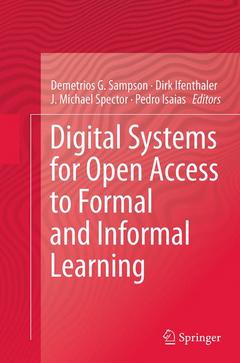Description
Digital Systems for Open Access to Formal and Informal Learning, 2014
Research from CELDA 2012
Coordinators: Sampson Demetrios G., Ifenthaler Dirk, Spector J. Michael, Isaias Pedro
Language: English
Publication date: 09-2016
Support: Print on demand
Publication date: 08-2014
347 p. · 15.5x23.5 cm · Hardback
Description
/li>Contents
/li>Biography
/li>Comment
/li>
Today, Digital Systems and Services for Technology Supported Learning and Education are recognized as the key drivers to transform the way that individuals, groups and organizations ?learn? and the way to ?assess learning? in 21st Century. These transformations influence: Objectives - moving from acquiring new ?knowledge? to developing new and relevant ?competences?; Methods ? moving from ?classroom? based teaching to ?context-aware? personalized learning; and Assessment ? moving from ?life-long? degrees and certifications to ?on-demand? and ?in-context? accreditation of qualifications. Within this context, promoting Open Access to Formal and Informal Learning, is currently a key issue in the public discourse and the global dialogue on Education, including Massive Open Online Courses (MOOCs) and Flipped School Classrooms.
This volume on Digital Systems for Open Access to Formal and Informal Learning contributes to the international dialogue between researchers, technologists, practitioners and policy makers in Technology Supported Education and Learning. It addresses emerging issues related with both theory and practice, as well as, methods and technologies that can support Open Access to Formal and Informal Learning. In the twenty chapters contributed by international experts who are actively shaping the future of Educational Technology around the world, topics such as:
- The evolution of University Open Courses in Transforming Learning
- Supporting Open Access to Teaching and Learning of People with Disabilities
- Assessing Student Learning in Online Courses- Digital Game-based Learning for School Education
- Open Access to Virtual and Remote Labs for STEM Education
- Teachers? and Schools? ICT Competence Profiling
- Web-Based Education and Innovative Leadership in a K-12 International School Setting
are presented.
An in-depth blueprint of the promise, potential, and imminent future of the field, Digital Systems for Open Access to Formal and Informal Learning is necessary reading for researchers and practitioners, as well as, undergraduate and postgraduate students, in educational technology.
Digital Systems for Open Access to Formal and Informal Learning.- I. Open Access to Formal and Informal Learning: Theory and Practice.- The Opem Discover Space Portal: A Socially-Powered and Open Ferderated Infrastructure.- The Evolution of University Open Courses in Transforming Learning: Experiences from Mainland China.- Massive Open Online Courses (MOOCs) and Massive Multiplayer Online Games (MMOGs): Synergies and Lessons to be Learned.- Supporting Open Access to Teaching and Learning of People with Disabilities.- Development of Visualization of Learning Outcomes Using Curriculum Mapping.- Assessing Student Learning Online.- Theorizing Why in Digital Learning.- II. Open Access to Formal and Informal Learning: Methods and Technologies.- Mobile Language Learners as Social Networkers.- A Mobile Location-Based SItuation Learning Frameworkf for Supporting Critical Thinking: A Requirements Analysis Study.- Developing Technological and Pedagogical Affordances to Support Collaborative Inquiry Science Processes.- Learning in or with Games?.- Digital Game-Based Learning in the Context of School Entrepreneurship Education: Proposing a Framework for Evaluating the Effectiveness of Digital Games.- Stimulating Learning via Tutoring and Collaborative Simulator Games.- A Methodology for Oraganizing Virtual and Remote Labs.- Creative Collaboration in a 3D Virtual World.- Active Creation of Digital Games as Learning Tools.- Augmented Reality and Learning in Science Museums.- From Teachers' to Schools' ICT Competence Profiles.- I2Flex: The Meeting Point of Web-Based Education and Innovative Leardership in a K-12 International School Setting.
Demetrios G. Sampson (Department of Digital Systems, University of Piraeus & Informatics and Telematics Institute, Centre for Research and Technology - Hellas, Greece, sampson@iti.gr) has received a Diploma in Electrical Engineering from the Democritus University of Thrace, Greece in 1989 and a Ph.D. in Electronic Systems Engineering from the University of Essex, UK in 1995. He is a Full Professor of Digital Systems for Learning and Education at the Department of Digital Systems, University of Piraeus, Greece and a Research Fellow at the Information Technologies Institute (ITI), Centre of Research and Technology Hellas (CERTH). He is the Founder and Director of the Advanced Digital Systems and Services for Education and Learning (ASK) since 1999. He is the co-author of more than 312 publications in scientific books, journals and conferences with at least 1400 known citations (h-index: 20). He has received 6 times Best Paper Award in International Conferences on Advanced Learning Technologies. He is a Senior and Golden Core Member of IEEE and he was the elected Chair of the IEEE Computer Society Technical Committee on Learning Technologies (2008-2011). He is Co-Editor-in-Chief of the Educational Technology and Society Journal (impact factor 1.171, 2012). He is also a Member of the Steering Committee of the IEEE Transactions on Learning Technologies, Member of the Editorial Board of 22 International/National Journals and a Guest Co-Editor in 26 Special Issues of International Journals. His participation in the organization of scientific conferences involves: General and/or Program Committee Chair in 35 International Conferences, Program Committees Member in 345 International/National Scientific Conferences. He has been a Keynote/Invited Speaker in 51 International/National Conferences. He has been project director, principle investigator and/or consultant in 65 R&D projects with external funding at the range of 14 Million € (1991-2016). He is the recipient
A genuinely multi-disciplinary approach to the use of digital systems for learning
Represents the best research from CELDA 2012
Includes both a practical approach and solid research base ?
Includes supplementary material: sn.pub/extras




